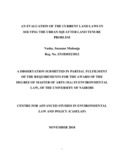| dc.description.abstract | Squatting is a global phenomenon fuelled by political and socio-economic factors. It is also a human rights issue. Its essence is the absence of tenure security and land use planning. In Kenya, squatting dates back to the colonial eon which marked the begging of land injustices. This is also compounded by the failure of the post-independence governments to employ innovative tools in generating appropriate intervention strategies for tenure security for urban squatters.
This study set out to evaluate the efficacy of the current land laws in dealing with urban squatting in Kenya. It sought to examine the factors that limit land governance in urban centres from finding long lasting solutions. In this regard, the study established that lack of political goodwill, coupled with adoption of non-inclusive solutions have greatly contributed to the failure in past approaches. The study relied on pre-existing data on tenure insecurity in urban informal settlements, specifically those on Mukuru and Kibera. Additionally, it incorporated interviews with personnel in key institutions dealing with urban informal settlements. The institutions include courts, government agencies and non-governmental organisations.
The study also took a comparative approach in examining the challenge of tenure insecurity in urban centres in other jurisdictions. The Philippines and South Africa were examined with the aim being to deduce the best practices in securing tenure within urban informal settlements. The experiences in these jurisdictions provide important lessons for the Kenyan context. The main lesson drawn from the Philippines experience is incorporation of participatory and inclusive approaches in developing solutions to the tenure security in the urban informal settlements. This had a great impact on the solutions as the resident of informal settlements take ownership of the measures, and the solutions are more context specific, hence a higher rate of success in implementation. South Africa takes a human rights perspective in securing tenure in informal settlements. This is primarily due to the robust constitutional dispensation adopted by the country in 1996. This is helpful to Kenya since most of the provisions in the 2010 Constitution mirror those of the Constitution of South Africa. Kenya can, therefore benefit, for example, with respect to the manner of judicial interpretation of socio-economic rights of informal settlers.
In the end the study suggests that use of the legal provisions on conversion of land and the settlement of informal settlers as communities is a most appropriate way of curbing the
tenure insecurity challenge. It also critical to have good political will and adopt participatory approaches in land governance in the urban centres. | en_US |



